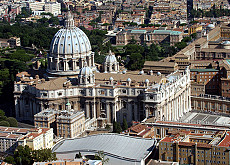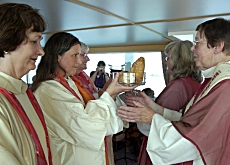Swiss Christians criticise Pope

Some Swiss Catholics have echoed Protestant criticism of Pope Benedict XVI's reassertion of the primacy of the Roman Catholic Church.
A 16-page document by the Vatican’s Congregation for the Doctrine of the Faith released this week stated that other Christian communities were either at fault or not true churches and that Catholicism was the only true path to salvation.
The head of the Swiss Bishops Conference, Kurt Koch, did not try to downplay the content of the Vatican document. But he did write on the conference’s website that the Vatican believed that the different churches were still not ready to recognise each other’s doctrines.
For this reason, he said that ecumenical dialogue had to continue.
Catholics in Lucerne reacted angrily to this stance, saying that they were disappointed by Koch. In an open letter published on Thursday, the governing body of the city’s Catholics wrote that it was sorry that other Christian denominations were being discriminated against by the Church’s hierarchy.
It added that most Catholics could not agree with the Vatican’s position, and that if anything, it should encourage more ecumenical dialogue at the local level.
Walter Müller, spokesman for the Bishops Conference, told swissinfo that so far no other Catholic communities had complained.
Unwelcome move
For Swiss Protestants, the publication is an unwelcome move by the pope, who only a few days earlier made a gesture towards traditionalist Catholics by making it easier to celebrate Mass in Latin.
The Federation of Swiss Protestant Churches said in a statement that Rome’s position threatened past ecumenical progress. It added that it was concerned that the Catholics would “no longer be in universal communion with other churches”.
The new document – approved by the Pope and formulated as five questions and answers – seeks to set the record straight on The Second Vatican Council’s ecumenical intent, saying some contemporary theological interpretation had been “erroneous or ambiguous” and had prompted confusion and doubt.
It also restates key sections of a 2000 document the pope wrote when he was prefect of the congregation, “Dominus Iesus”.
“Christ ‘established here on earth’ only one Church,” the document says. The other communities “cannot be called ‘churches’ in the proper sense” because they do not have apostolic succession – the ability to trace their bishops back to Christ’s original apostles.
The Protestant Federation president, Thomas Wipf, told Le Temps newspaper that it might prove difficult to pursue a dialogue with the Catholic hierarchy. “The Vatican is trying to set the conditions, and that is unacceptable,” he said.
For Wipf, the Vatican cannot define what constitutes a church outside its own parish. “We are surprised by Rome’s assertion that it is the only Church,” he added.
A grouping of evangelical churches in Switzerland also condemned the Vatican publication. The Evangelical Alliance said the Christian church was not limited to one institution.
“The worldwide church consists of all people who have freely decided to give their life to Jesus Christ,” it said in a statement.
Problems ahead
For Albert Longchamp, a leading Swiss Catholic journalist and priest, the Vatican document is aimed at shoring up the church from within, and showing some of its members that it is not becoming Protestant.
“The Catholic Church cannot surrender its identity, and nobody is asking it to,” he told Le Temps. “But to claim to be the only caretaker of Christ’s legacy is not defensible.”
According to Longchamp, the Vatican publication fails to take into account the reality of countries such as Switzerland and Germany, where Catholicism must share space with the Protestants.
The Jesuit believes that ecumenical dialogue is seriously threatened. “We will have some major problems this autumn,” he added.
swissinfo with agencies
According to the last federal census, 41.8 per cent of Swiss are Roman Catholic, 35.3 per cent Protestant, while 15.4 per cent say they have no religious affiliation.
The Muslim community represent more than 300,000 people, while there are fewer than 20,000 Jews.
The 2005 Eurobarometer poll found that 48 per cent of Swiss are theist, 39 per cent expressed a belief in “a spirit or life force”, 9 per cent said they were atheist while 4 per cent were agnostic.

In compliance with the JTI standards
More: SWI swissinfo.ch certified by the Journalism Trust Initiative











You can find an overview of ongoing debates with our journalists here . Please join us!
If you want to start a conversation about a topic raised in this article or want to report factual errors, email us at english@swissinfo.ch.